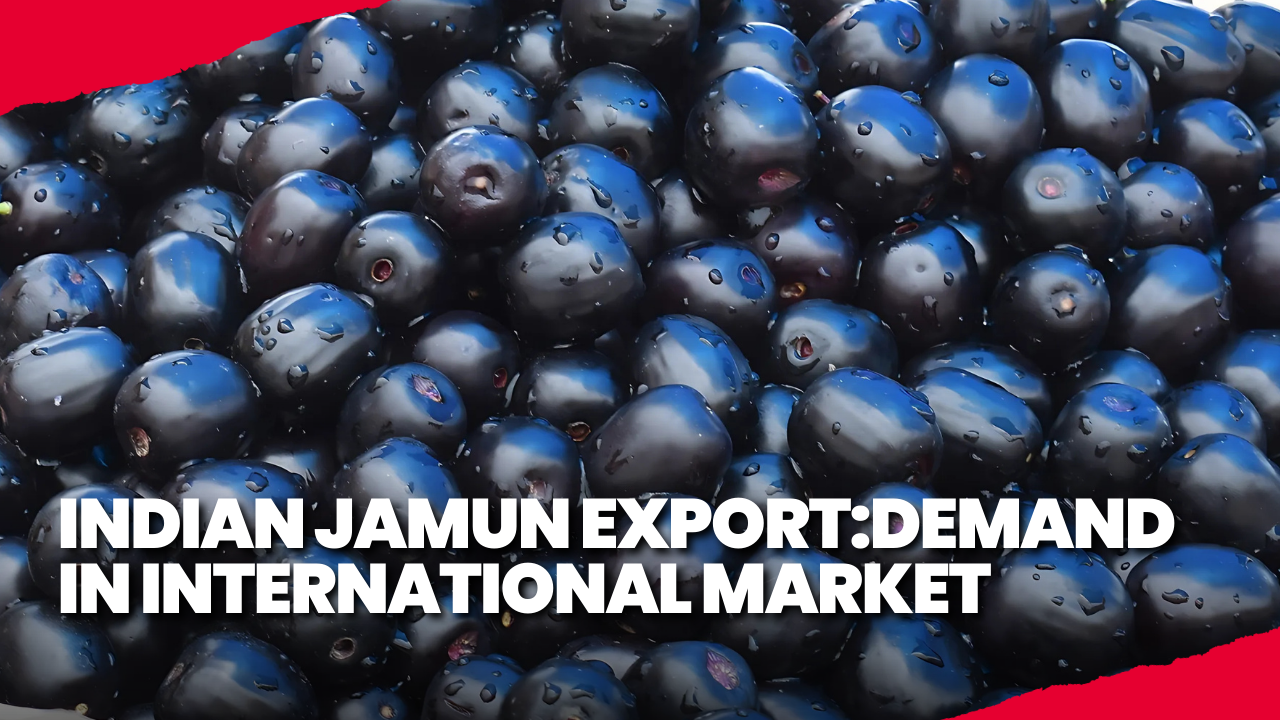
More and more health-conscious people are looking into superfoods. Jamun, which is also called Java plum or Indian blackberry, is one of the newest flavors. The deep purple color, high antioxidant content, and health benefits, especially for controlling diabetes and digestion, make jamun more famous. What does this mean for India, though, where this fruit grows in large amounts? The process of jamun fruit export from India is finally picking up speed, and with the international demand increasing for Jamun export, you should keep updated on it.
Why Everyone Wants Jamun
The demand for Jamun is mainly due to the growing interest in Ayurvedic and plant-based goods everywhere. Jamun is an excellent food for today’s diet because it has a low glycemic index, a lot of fiber, and powerful nutrients. More and more countries, such as the UAE, UK, USA, Canada, and Singapore, want to buy fresh jamun, frozen pulp, seed powder, and even nutraceuticals made from jamun. Some of the health benefits of jamun are as follows.
- Monitoring and controlling blood sugar levels
- Help with detoxification
- Better gut health and digestion
- Better oral and skin health
India naturally leads the way in exporting jamun because it is becoming more popular and in demand.
How is the jamun fruit export from India right now?
Jamun wasn’t used much in international trade until recently because it went bad quickly, and there weren’t any organized supply chains. Things change quickly, though.
- India began to export fresh jamun to the UK in 2024, which gave farmers and agri-exporters new ways to make money.
- People in North America, Europe, and the Middle East also get frozen jamun pulp, seed powder, and prepared goods.
- Trade data shows that Uttar Pradesh, Maharashtra, Bihar, and Tamil Nadu are the central Indian states that provide Jamun.
The export potential is enormous, even though large-scale numbers are still in development.
What are the difficulties in the jamun fruit export from India
Even though things look good, there are still problems to solve.
- Fresh jamun has a short shelf life, making logistics complicated.
- Farmers and traders aren’t aware of the problem
- Export consistency is affected by seasonal availability.
- Meets or exceeds all applicable international standards for quality and packaging
Fortunately, the challenges in jamun export are gradually being overcome with the right planning, technological advancements, and support. This reassures the audience about the industry’s resilience and ability to adapt to changing conditions.
Also Read This: The Indian Clove Trade – Exports, Imports, and Market
Top Destinations for Indian Jamun Exports
Some of the major countries that import Indian Jamun and jamun-based products include.
- United Arab Emirates (UAE)
- United Kingdom (UK)
- United States of America (USA)
- Nepal
- Bangladesh
- Singapore
Along with the fruit, these nations are also taking advantage of the rising popularity of jamun seed powder as a nutritional supplement. Jamun seed powder is rich in antioxidants and is increasingly recognized for its health benefits. This diversification of products not only expands the market but also adds value to the export portfolio.
What makes Jamun’s exports grow?
- People who care about their health seek less-known fruits like jamun for their healing properties.
- Agricultural Export Promotion Schemes offer cold storage and quality control labs and help export delicate products like jamun.
- Imports to Europe and the US are primarily caused by organic jamun farming and jamun pulp, which comes from natural sources.
- Farmer Producer Organizations (FPOs) are making it easier for small farmers to join foreign markets as a group, which increases income and makes logistics easier.
Eco-friendly farming and sustainability in Jamun exports
The growing interest in safe and eco-friendly farming methods is another thing that is helping Jamun’s exports grow. A lot of farmers in India are switching to organic farming to reduce chemical use and protect biodiversity. This makes the fruit more popular and also fits with the developing trend of foreign buyers wanting clean, natural products.
Wrapping It Up
The jamun fruit export from India has a great future because of strong demand and natural advantages. It’s on its way to becoming an admired health fruit from something that used to be a seasonal treat. India’s jamun fruit exports can make a big difference in rural income and health trends if they invest revenue into adding value, building supply lines, and branding. India just needs to figure out how to make it better.
FAQs
India exports fresh fruit, frozen pulp, seed powder, juices, and nutraceuticals made from Jamun. International demand for organic and Ayurvedic superfoods has spurred interest in Jamun-based health supplements.
Jamun’s antioxidants, fiber, and low glycemic index make it appealing to health-conscious consumers. The UK, USA, UAE, and Singapore import Indian Jamun due to its diabetes-friendly and digestive health advantages and the growing desire for natural and organic superfoods.
Jamun’s perishability limits fresh fruit exports. However, cold storage support, government export initiatives, and the increasing need for processed Jamun goods like pulp and seed powder offer excellent expansion prospects. Branding and supply chain management help improve India’s export share.
Also Checkout Our YouTube Channel: @limeinstituteofexportimport






